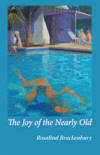The Joy of the Nearly Old
There is still so much surprise to be had in “old” age. In the title poem of The Joy of the Nearly Old, Rosalind Brackenbury writes of a dying poet, “poetry / changes nothing in the world, / only poetry. But poetry, he told me, / is everything.” In Brackenbury’s world, the poem is the oasis. Viewing life as an extended poem, one unendingly upbeat though not without its share of obstacles, is one way the poet’s speaker continues to find surprise in “nearly old” age. Death is inevitably sprinkled throughout the pages of a book about aging, waving to us from over the brink, but sadness remains largely buried under the surface of these poems, particularly those about death. Even death is not so daunting; it is always met with optimism, as after all it has only “terrier jaws.” The Joy of the Nearly Old is minimal in structure—short lines compose short poems; syntax and diction are simple and airy—but it is only deceptively minimal in idea. To say it plainly, the poet makes writing poignant poems—the kind that sting like bees and are gone before you know what has happened—look easy. In these poems, small things physically fill big spaces, and the same is figuratively true of Brackenbury’s writing prowess.
There is still so much surprise to be had in “old” age. In the title poem of The Joy of the Nearly Old, Rosalind Brackenbury writes of a dying poet, “poetry / changes nothing in the world, / only poetry. But poetry, he told me, / is everything.” In Brackenbury’s world, the poem is the oasis. Viewing life as an extended poem, one unendingly upbeat though not without its share of obstacles, is one way the poet’s speaker continues to find surprise in “nearly old” age. Death is inevitably sprinkled throughout the pages of a book about aging, waving to us from over the brink, but sadness remains largely buried under the surface of these poems, particularly those about death. Even death is not so daunting; it is always met with optimism, as after all it has only “terrier jaws.” The Joy of the Nearly Old is minimal in structure—short lines compose short poems; syntax and diction are simple and airy—but it is only deceptively minimal in idea. To say it plainly, the poet makes writing poignant poems—the kind that sting like bees and are gone before you know what has happened—look easy. In these poems, small things physically fill big spaces, and the same is figuratively true of Brackenbury’s writing prowess.
In The Joy of the Nearly Old, the wisdom and immense, oftentimes invisible, elation that accompany age—the satisfaction, reverence, and possibility in the “simple” things—are lyrically woven and sung throughout these pieces. It would be unfairly dismissive, however, to leave them at “simple” in the speaker’s world; to her they are everything. Brackenbury fills her poems to the brim with bees and splinters of wood and the sounds of birds, each packing the intensity of the world it inhabits by being the very focal point of its own small poem-world. Across these lines, it is always about what was eaten and what was drunk and what was discussed, and never letting the quotidian be merely that.
In “A Man and a Woman and a Blackbird,” after Wallace Stevens, the poet writes, “it’s so much easier now / not being young and in a hurry.” Never have we been made more aware of the cosmic, jigsaw-like perfection of slowing down and realizing how pieces of the world fit together: a listener—or two—for every note of birdsong; everything is allowed its place.
Though just when we think things are a little too neat, or the poems hand themselves too easily over to the book’s conceit, when things are slowing down perhaps too much, the calm and reflective subside, making way for the exhilarating, moving across time and geography, igniting with the tactile power of memory, and still the poet sustains an immense control over language. Just when we are beginning to doubt Brackenbury’s seemingly ceaseless brand of optimism, she gets real with us. In “Poems Used To,” the writer pleads:
Now, I confess,
I need you, the reader, to be there,
tell me you get it, even
feel the same; life flowing past us,
no detail too small, banal or frail to matter.
The poet finally becomes fallible, afraid. It is not all resigned, happy, retrospective fatalism; the book evolves the way a mind does. It reaches out, desperate for the connection of dialogue. It is no longer enough just to be the writer of poems. If Brackenbury’s poems were merely reverent, they would risk triteness. Waxing about the beauty of foreign lands eventually gives way to a poem about Peru where all the poet wants is to go home. What does it mean to be home though? The question is explored again and again in these pages. There are too many stories to tell about home. To be home, comfortable and safe, is to also be burning.
These lines warn and urge us, as readers, to cautiously let go of all the hurt we hold within us. They urge us to be “crazy with joy” despite our invisibility to the world. Be satisfied, they say. Accept some confusion, passiveness, contentment, inevitability. Don’t whine over the way things are; some things change, some stay the same. Examine the world but not too closely. In a book filled with mentions of “old friends,” Brackenbury reminds the reader other people always help us see the world more beautifully, who or whatever those old friends may be. “Letters Home” captures the book’s sentiment perhaps most astutely: “madly, furiously, bicycling, in love,” the way we should all aspire to live, always. Life is the poem we must always be burning to write; “School, 1950s,” a personal favorite of the collection, insists “writing and burning” always go hand-in-hand.





